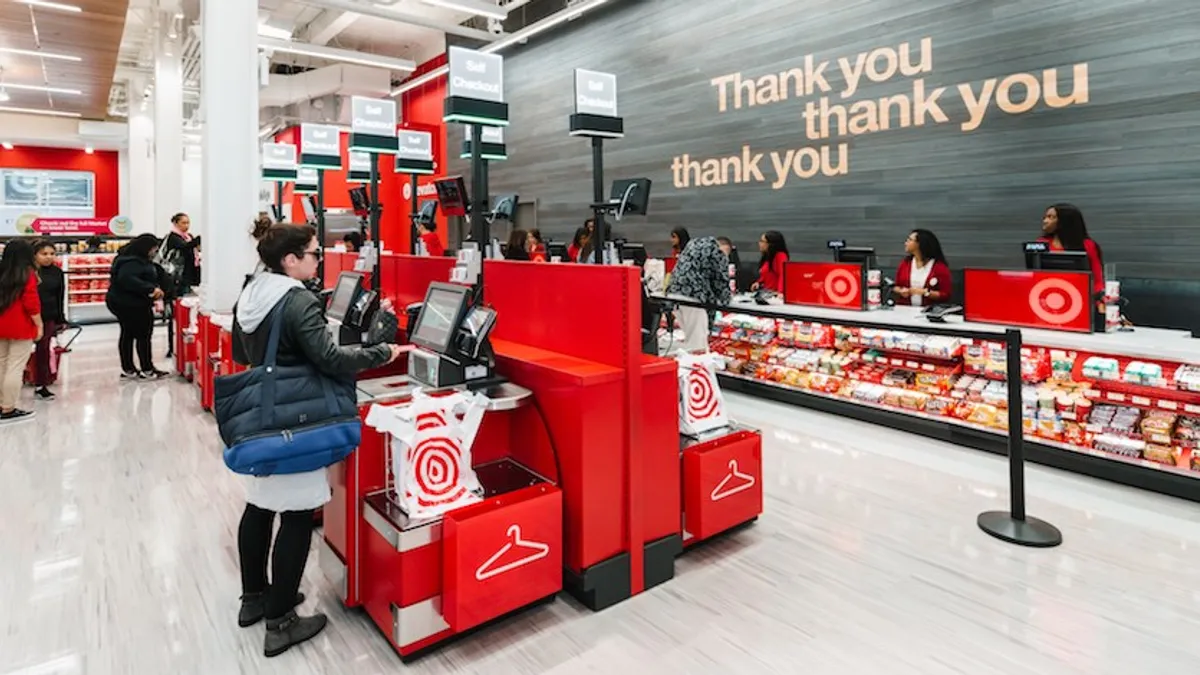Dive Brief:
- Target's second quarter sales rose 3.6% year over year to $18.2 billion, with comparable sales increasing 3.4%, customer traffic up 2.4% and digital sales growth of 34%.
- Over a two-year window, comps rose 10%, marking the mass merchant's best performance in more than a decade, Target said in a press release.
- Target's Q2 operating income expanded by about 17%, to $1.3 billion, as gross margin increased 30 basis points to 30.6% and the retailer's expense rate fell. Net earnings increased 17.4% to $938 million.
Dive Insight:
Once again this year Target followed fellow mass merchant Walmart in posting a strong quarterly performance at a time of malaise for many other retailers.
And once again, the company and analysts credited Target's initiatives and investments that it's launched in recent years. CEO Brian Cornell pointed to the "strategy and the durable financial model we've built over the last several years" with the strong Q2 numbers.
"By appealing to shoppers through a compelling assortment, a suite of convenience-driven fulfillment options, competitive prices and an enjoyable shopping experience, we're increasing Target's relevancy and deepening the relationship between our guests and our brand," he said.
Investors seemed to agree with Cornell's sunny take on the company, as the company's stock rose 7.8% in premarket trading. Target beat the FactSet consensus on revenue, comps and earnings, according to figures cited by MarketWatch. All this good news from the company comes amid concerns in recent weeks about trade war tensions and a weakening economic outlook.
Analysts, too, praised Target's strategic moves of late. "Every measurable demonstrates continued acceleration and validates the company's strategic shift articulated in February 2017, proving that short-term pain can generate long term gains if the strategy is well executed," Moody's vice president Charlie O'Shea said in emailed comments. He added that Target's runway for growth "will likely be longer and wider with food now being repositioned," with a new private label line that gives Target extra margin and exclusive products.
"Overall, we believe Target's strategic transformation initiatives — price investment in everyday items, differentiating merchandising with new private brands, remodeling stores, and investing in digital and delivery, including Shipt — are resonating with consumers," analysts with Telsey Advisory Group said in a client note emailed to Retail Dive. "Target also stands to gain from ongoing industry consolidation."
Neil Saunders, managing director of GlobalData Retail, said in emailed comments that Target's Q2 numbers show the retailer is "engineering its own growth rather than simply fluctuating with the vagaries of the consumer economy."
Saunders pointed out that Target's sales growth was driven both by digital and physical channels, as well as blended channels like in-store pickup and drive-up purchases. "Although many in the investment community were skeptical, Target rightly understood the importance of the store to the health of its whole operation," Saunders said. "This is why store refurbishments have been such a vital component of the success story."
He noted that his firm's data showed that store remodels gave store visits a bump. Meanwhile, Target's expansive private label strategy — which includes "now well-established" labels including Cat & Jack, A New Day, Made By Design and Smartly — are "securing Target new customers and increased spending across apparel, home furnishings and home essentials," Saunders said.















